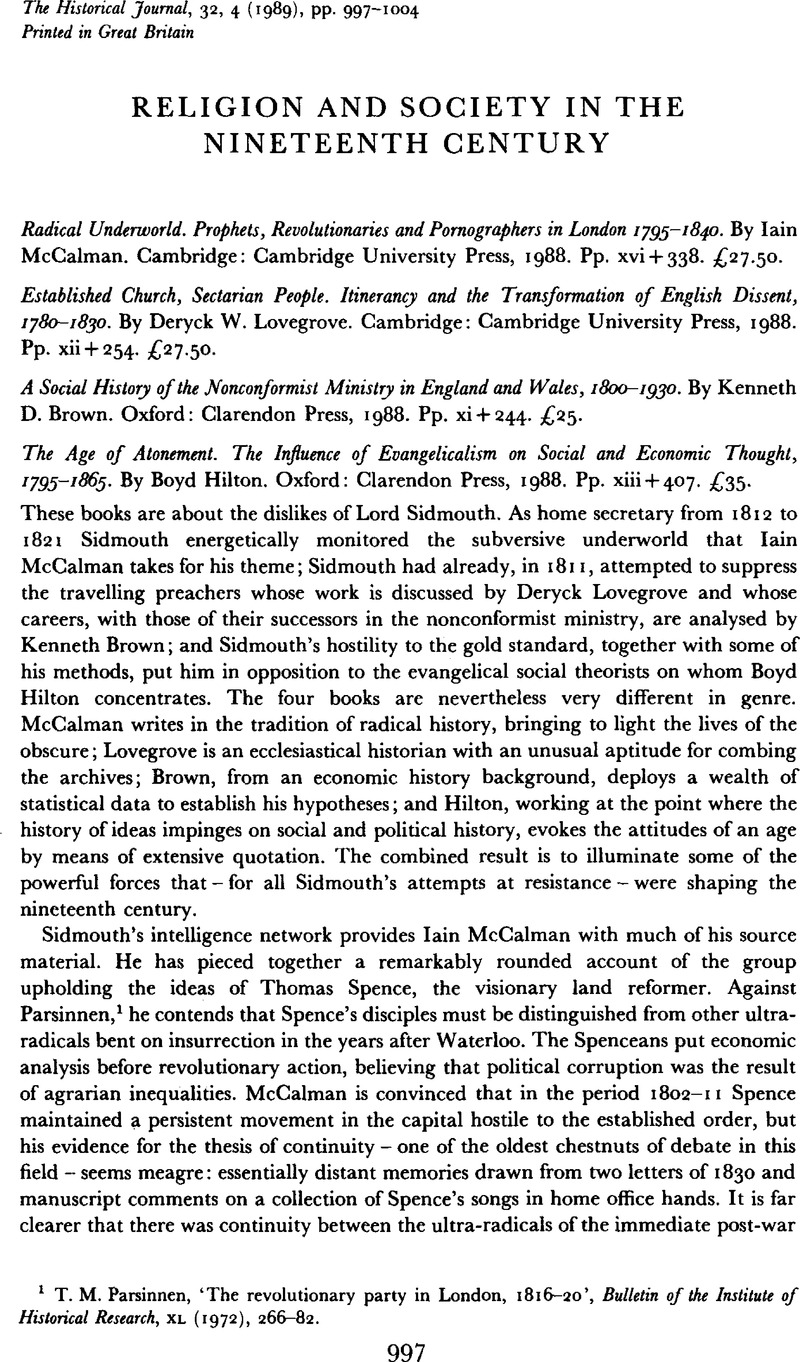Article contents
Religion and Society in the Nineteenth Century
Published online by Cambridge University Press: 11 February 2009
Abstract

- Type
- Review Articles
- Information
- Copyright
- Copyright © Cambridge University Press 1989
References
1 Parsinnen, T. M., ‘The revolutionary party in London, 1816–20’, Bulletin of the Institute of Historical Research, XL (1972), 266–82CrossRefGoogle Scholar.
2 McCalman, I. D., ‘Unrespectable radicalism: infidels and pornography in early nineteenth-century London’, Past and Present, CIV (1984), 74–110CrossRefGoogle Scholar.
3 Harrison, J. F. C., The second coming: popular millenarianism, 1780–1850 (London, 1979)Google Scholar.
4 Bebbington, D. W., Evangelicalism in modern Britain: a history from the 1730s to the 1980s (London, 1989), p. 82Google Scholar.
5 Virgin, Peter, The church in an age of negligence: ecclesiastical structure and problems of church reform, 1700–1840 (Cambridge, 1989)Google Scholar.
6 Everitt, Alan, The pattern of rural dissent: the nineteenth century (Leicester, 1972)Google Scholar.
7 Thompson, E. P., The making of the English working class (Harmondsworth, 1968 edn)Google Scholar, ch. XI.
8 Currie, R. et al. , ed., Churches and churchgoers: patterns of church growth in the British Isles since 1700 (Oxford, 1977), p. 140Google Scholar.
9 Cox, Jeffrey, The English churches in a secular society: Lambeth, 1879–1930 (New York, 1982), ch. VIIGoogle Scholar.
10 Hilton, Boyd, ‘The role of providence in evangelical social thought’, in History, society and the churches, ed. Beales, Derek and Best, Geoffrey (Cambridge, 1985)Google Scholar.
11 Norman, E. R., Church and society in England, 1770–1970: a historical study (Oxford, 1976)Google Scholar.
12 Brown, S. J., Thomas Chalmers and the godly commonwealth in Scotland (Oxford, 1982)Google Scholar.
13 Ramsey, A. M., From Gore to Temple: the development of Anglican theology between ‘Lux Mundi’ and the Second World War, 1889–1939 (London, 1960)Google Scholar.
14 Milne, A. J. M., The social philosophy of English Idealism (London, 1962)Google Scholar.
15 Burrow, J. W., Evolution and society: a study in Victorian social theory (Cambridge, 1966)Google Scholar, Wiener, M. J., English culture and the decline of the industrial spirit, 1850–1980 (Cambridge, 1981), chs. III, IVGoogle Scholar.
16 As previously in Hilton, Boyd, ‘Gladstone's theological politics’, in High and low politics in modern Britain, ed. Bentley, Michael and Stevenson, John (Oxford, 1983)Google Scholar.
17 Bebbington, , Evangelicalism, pp. 81–6Google Scholar.
18 Wiener, English culture, ch. III.
19 Parry, J. P., Democracy and religion: Gladstone and the Liberal party, 1867–1875 (Cambridge, 1986)CrossRefGoogle Scholar. Brent, Richard, Liberal anglican politics: whiggery, religion and reform, 1830–1841 (Oxford, 1987)Google Scholar.
- 1
- Cited by


